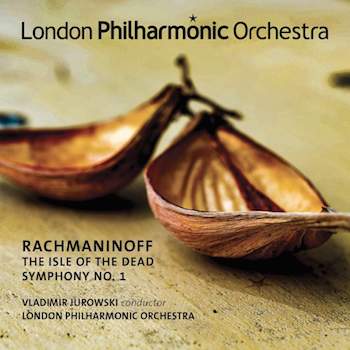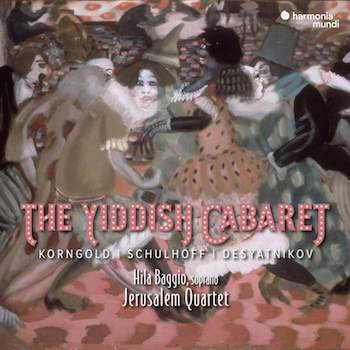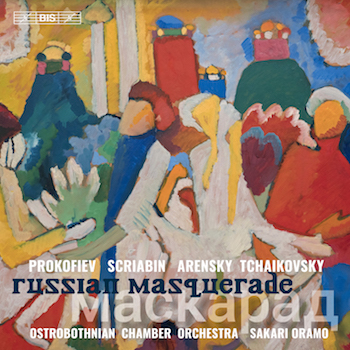Classical CD Reviews: Jurowski conducts Rachmaninoff, Yiddish Cabaret, and Russian Masquerade
By Jonathan Blumhofer
Vladimir Jurowski’s new recording of Rachmaninoff’s Symphony no. 1 is a tightly-played, exciting reading. The Yiddish Cabaret’s only real offense relates to poor labeling. The transcriptions in Russian Masquerade are played with spunk and vitality.

Few composers have suffered more acutely from a bad premiere – or recovered more brilliantly – than Sergei Rachmaninoff with his Symphony no. 1. The unmitigated failure of its 1895 premiere gave the composer a psychological breakdown and the piece was never played again during his lifetime.
Since its reappearance after World War 2, the Symphony’s entered the fringes of the repertoire, though it’s not Rachmaninoff’s best work. Sometimes long-winded, structurally awkward, and thematically lacking, the First is very much the work of a young composer.
But its most striking moments – like the delicate segue into the first movement’s second theme (in a 7/4 meter!) – plus Rachmaninoff’s crafty manner of highlighting the piece’s motivic and rhythmic interconnectedness are fresh, indeed.
Vladimir Jurowski’s new recording of the score with the London Philharmonic Orchestra (LPO) certainly captures those elements. Theirs is a tightly-played, exciting reading, that is attentive to the music’s subtle gradations of tempo and dynamics. The outer movements are mighty and driven (the LPO’s articulations of the finale’s galloping syncopations swagger brilliantly), the inner ones luminescent.
Filling out the album is a solid performance of a better piece, Rachmaninoff’s 1909 tone poem The Isle of the Dead. This reading’s a bit more fluent and less portentous than Jurowski’s 2005 recording of the same forces. It’s warmly lit throughout: the opening 5/8 section is winningly nebulous, while the passionate climaxes soar.

Let’s just say it: The Yiddish Cabaret isn’t, perhaps, the best title for the Jerusalem Quartet’s new album. Yes, Erich Wolfgang Korngold and Erwin Schulhoff were Jewish. But their music, at least as presented here, doesn’t naturally fall under the rubric of either being “Yiddish” or hailing from the world of “cabaret.”
Certainly nothing about Korngold’s String Quartet no. 2 suggests the latter. Rather, this 1933 score is about as representative of the composer’s refined, chromatic, occasionally folksy style as you’re apt to find. The Jerusalem’s play it elegantly: the opening movement is rich and noble, the “Intermezzo” ambles with bumptious charm, while the “Larghetto” sings tenderly and the final waltz is deliciously off-kilter.
Schulhoff’s 1924 Five Pieces for String Quartet veers a bit closer to brash world of the speakeasy, drawing on popular musical styles of the ‘20s. But it belongs more to the concert hall than the theater stage. A collection of period dance forms (mostly), the Five Pieces are bracingly free with their rhythms and harmonies.
The Jerusalem’s performance never stints on energy or color; indeed, it overflows with character. Shining particularly bright are the sul ponticello/col legno textures of the “Alla Serenata” and the driving phrases of the “Alla Czeka” (like Bartók with a smile, that last one).
Only Leonid Desyatnikov’s Five Songs really fulfill the promise of The Yiddish Cabaret’s appellation. Adapting Yiddish songs sung in Poland between the World Wars, Desyatnikov’s concocted a thoroughly engaging and ingratiating piece: snappy, tuneful, full of life. It’s sung here with brightness and élan by soprano Hila Baggio. If only the whole disc had been comprised of fare like these Five Songs…
At any rate, you won’t be disappointed by any of these performances: The Yiddish Cabaret’s only real offense relates to poor labeling. But that’s forgivable; by all means, it shouldn’t deter you.

Transcribing keyboard music for strings can be a sticky business. But if you’ve got a knack for it, the results can be conspicuously engaging.
Rudolf Barshai certainly did, as his adaptation of Sergei Prokofiev’s Visions fugitives demonstrates. Originally a set of twenty kaleidoscopic keyboard miniatures, Barshai transcribed fifteen of them for string orchestra.
The results, as heard on the Ostrobothnian Chamber Orchestra’s (OCO) new recording, Russian Masquerade, snap and seethe. Here, the savage attacks in nos. 5 and 14 come over with assured force, while the lyrical phrases of nos. 8 and 9 dance with rhapsodic charm and nos. 11 and 15 bristle with irony.
Jouni Kaipainen’s settings of thirteen of Alexander Scriabin’s twenty-four Preludes (op. 11) exhibits a similarly idiomatic command of instrumentation. Kaipainen’s refitting of the G-major Prelude (no. 13) is lush and fervent; the E-major (no. 14) rumbles turbulently; the F-sharp-minor (no. 8) tumbles mysteriously; and the F-minor (no. 18) boils. Like the Barshai, Kaipainen’s is a thoroughly convincing transformation.
Anton Arensky’s Variations on a Theme of Tchaikovsky and Tchaikovsky’s Elegy were the disc’s two entries originally written for strings.
The latter draws on one of Tchaikovsky’s songs and receives a characteristically mellifluous treatment from Arensky (who was no slouch of a composer, himself). It’s best moments – like the galloping strings over the songful theme during the second variation and the inverted theme in the seventh – are stirring, indeed.
Tchaikovsky’s Elegy, on the other hand, is a sober, glowing tribute to the actor Ivan Samarin, full of warmth and melancholy.
Sakari Oramo leads the OCO in polished, transparent performances of each piece. The transcriptions are played with spunk and vitality, while the Arensky and Tchaikovsky shine – the latter, in particular, recalls the Serenade for Strings in its singing textures.
Jonathan Blumhofer is a composer and violist who has been active in the greater Boston area since 2004. His music has received numerous awards and been performed by various ensembles, including the American Composers Orchestra, Kiev Philharmonic, Camerata Chicago, Xanthos Ensemble, and Juventas New Music Group. Since receiving his doctorate from Boston University in 2010, Jon has taught at Clark University, Worcester Polytechnic Institute, and online for the University of Phoenix, in addition to writing music criticism for the Worcester Telegram & Gazette.
Tagged: Bis, Harmonia Mundi, Jerusalem Quartet, London Philharmonic Orchestra, LPO Live
